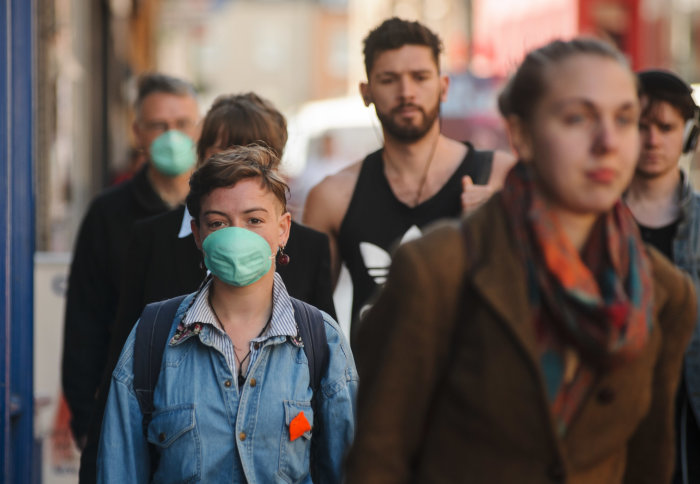Team of experts put forward a sustainable approach to coronavirus recovery

Campaigners in Edinburgh wear masks to highlight air pollution and call for clean air measures. Credit: Maverick Photo Agency
Researchers from the UK’s top universities have found that climate-friendly investment policies are the best medicine for a failing economy.
A new analysis of policies designed to promote economic recovery following the global coronavirus pandemic has led the experts to recommend ten concrete measures that will slow global warming while creating new jobs.
This comes as governments make plans to lift measures that suppress the pandemic, while shoring up their economies and peoples’ livelihoods.
A group of more than 30 UK universities, formed to help deliver positive outcomes at the UN Climate Summit in Glasgow (COP26), have highlighted the fiscal recovery policies that promise to bring both short-term high economic impact and long-term structural change to ensure the UK meets its 2050 climate goals.
Members of the ‘COP26 Universities Network’, of which Imperial College London is a founding member, have drawn on new analysis to create a briefing for policymakers outlining their recommendations to “build back better.”
Clean slate
The authors of the briefing drew on a new paper, being published in Oxford Review of Economic Policy, that catalogued more than 700 stimulus policies and conducted a global survey of 231 experts from 53 countries, including senior officials from finance ministries and central banks.
Drawing on this survey as well as learnings from the 2008 financial crisis, they found that green projects create more jobs and deliver higher short-term returns per dollar spent. As the cost of technologies continues to drop, businesses, consumers and governments save money over the long-term, when compared with traditional fiscal stimulus.
"Some of the changes forced upon us by this pandemic, including far more homeworking and far less travel, have inadvertently given us a tantalising glimpse of what a future with quieter, cleaner streets and less stressful commuting might look like." Dr Ajay Gambhir Senior Research Fellow at the Grantham Institute - Climate Change and the Environment
Examples include investment in renewable energy production, such as wind or solar power. In the short term, constructing the infrastructure needed to generate clean energy is particularly labour intensive, creating twice as many jobs per dollar as building new fossil fuel infrastructure, as well as there being a greater base of industries to deliver domestic jobs.
Dr Charles Donovan, co-author of the briefing and Director of the Centre for Climate Finance and Investment at Imperial College Business School, said: “Clean energy is not just affordable and reliable, it also offers the highest return on investment. Investors have a growing appetite to put money to work in sustainable finance. Governments need to re-write the rules so that they can.”
Priority policies
Among the policies the group recommends for the UK government are investing in renewable energy infrastructure, reducing industrial emissions through carbon capture and storage (CCS) technologies, investment in broadband internet to increase coverage, electric vehicles and supporting nature-based solutions for reducing and adapting to the impact of climate change.
Another Imperial co-author, Dr Ajay Gambhir, Senior Research Fellow at the Grantham Institute - Climate Change and the Environment, said: “Some of the changes forced upon us by this pandemic, including far more homeworking and far less travel, have inadvertently given us a tantalising glimpse of what a future with quieter, cleaner streets and less stressful commuting might look like. Supporting these changes, through accelerated investment in home broadband and electric vehicles, as well as low-carbon, energy efficient homes, makes excellent economic and environmental sense.”
The briefing further called for the Cabinet Committee on Climate Change to be renamed the Climate Change Emergency Committee to reflect the urgent need for UK leadership and action.
Global leader
Most G20 governments have implemented significant relief measures as a result of the pandemic. But, as yet, none has introduced any significant fiscal recovery measures. The authors hope that all countries will seize this once-in-a-generation opportunity to embed these evidence-based criteria into national plans – for their economies and the environment.
The COP26 Universities Network aims to improve access to evidence and academic expertise for COP26 for the UK government, NGOs and the international community. It demonstrates and activates the role of UK universities and world-leading science and research in contributing to a net-zero emissions and resilient future.
This inaugural briefing highlights the role of the UK as President of the UN Climate Summit COP26, as well as the opportunity to lead by example with a green recovery package.
Alyssa Gilbert, Director of Policy and Translation at the Grantham Institute – Climate Change and Environment at Imperial commented: “UK universities are leaders in research on climate change science and solutions – from engineering through to the economics, behavioural science and policy options.
“The COP26 Universities Network delivers our knowledge directly into the hands of policymakers to help the UK build back better, embedding climate change concerns into creating a healthy and prosperous nation.
“As President of the next international climate change negotiations, the UK must demonstrate how a green economic recovery is possible.”
In recent months hundreds of donors have supported Imperial’s efforts to combat coronavirus, including via the College’s COVID-19 Response Fund. To join them and find out more, visit the Imperial College COVID-19 Response Fund webpage.
Article supporters
Article text (excluding photos or graphics) © Imperial College London.
Photos and graphics subject to third party copyright used with permission or © Imperial College London.
Reporter
Simon Levey
Communications Division
Laura Singleton
Communications Division